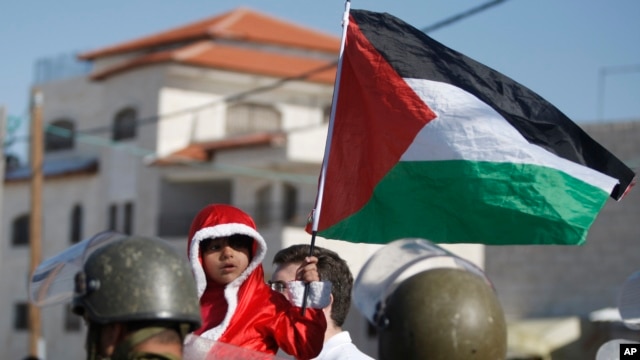Palestinians Win Right to Fly Flag at UN
The international body voted 119-8 to allow nonmember observer states to raise their flags at U.N. headquarters and offices. The Palestinians and the Vatican are the only two U.N. nonmember observer states.
Palestinian Ambassador Riyad Mansour welcomed the decision, saying, “This resolution today is yet another significant step in affirming the international consensus in favor of Palestinian independence.”
More than 50 states co-sponsored the controversial draft resolution.
But several states said it reversed 70 years of U.N. tradition holding that only full member states could fly national flags. They argued the Palestinians did not offer a compelling reason to justify changing this long-held practice.
Vatican to decline
The Vatican, or Holy See, distanced itself from the Palestinian action, saying it noted the long-established U.N. tradition of displaying only flags of full member states.
Papal Nuncio Bernardito Auza told reporters the day before the vote that the Vatican had “no intention” of raising its flag at the U.N. if the measure passed. The Vatican has held observer status since 1964.
The Palestinians have been represented in the U.N. General Assembly since 1974. In 2012, the body voted to upgrade their status to that of nonmember observer state.
The Palestinian delegation could not participate in Thursday’s flag vote, because it has no voting rights as an observer state.
Israel’s outgoing ambassador, Ron Prosor, said in his final statement before the world body that the flag raising would not change anything on the ground for the Palestinian people.
Prosor complained that the more the Palestinians say “no,” the more the international community “says ‘yes’ to their every whim and caprice.” He accused the assembly of being a puppet of the Palestinians, saying members would “vote to declare that the Earth is flat if the Palestinians proposed it.”
He said the international community must tell the Palestinians to stop stalling and go to the negotiating table.
Votes in opposition
The United States joined Israel, Canada, Australia and four Pacific Island nations in voting against the measure.
U.S. Ambassador Samantha Power reiterated Washington’s support for achieving a negotiated two-state solution in the Israeli-Palestinian peace process, saying that a sustainable and just resolution could be reached only “through hard choices and compromise negotiated by the parties.”
She added that “raising the Palestinian flag outside the U.N. headquarters is not an alternative to negotiations, and will not bring the parties closer to peace.”
Many of the 45 abstentions came from European Union member states, although they were not unified in their position.
The resolution approved by the assembly requests the secretary-general to take the necessary measures to implement it within 20 days, which would be September 30, the day Palestinian President Mahmoud Abbas is due to address the annual U.N. gathering of world leaders.

